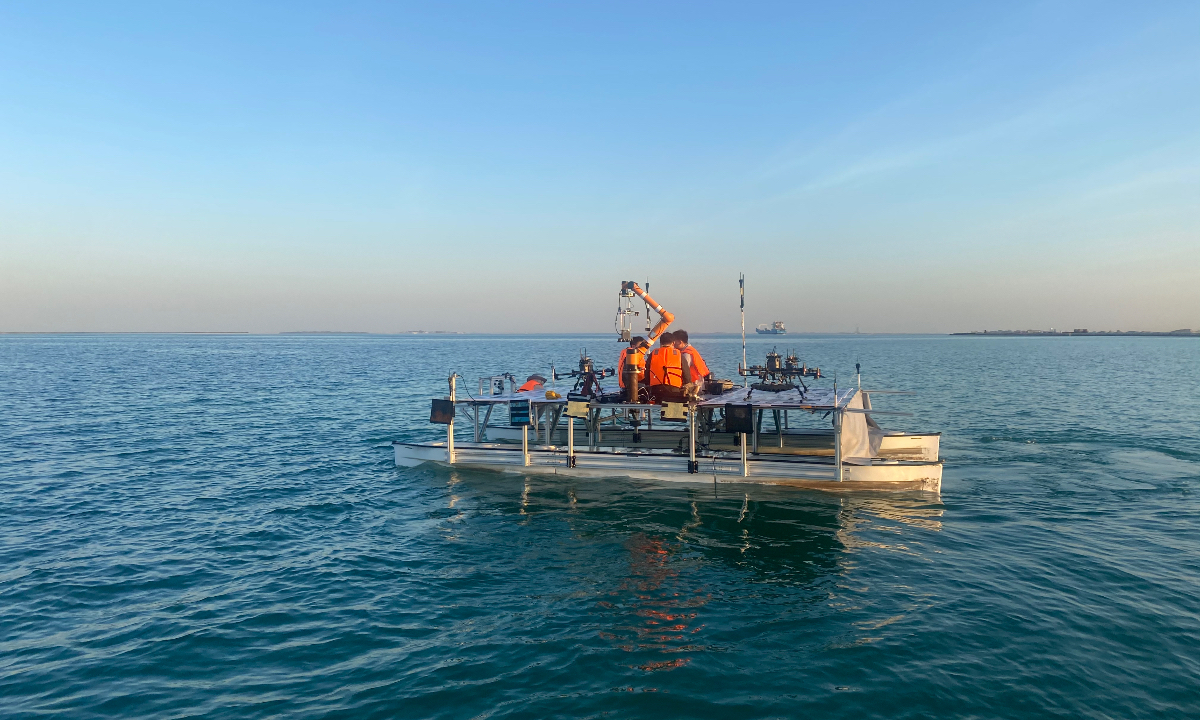Scientists gather in Abu Dhabi to explore ways to use autonomous robotics safeguarding maritime environment and security

Photo: Courtesy of Beijing Institute of Technology
The mounting maritime challenges such as pollution, illegal fishing and conflicts on the ocean are not only endangering our environment, they also pose challenges to trade and global security. Recently, scientists gathered in Abu Dhabi, United Arab Emirates, to discuss the vast potential of autonomous robotics to solve some of these pressing issues.
Five leading teams of robotics experts convened on Yas Island in Abu Dhabi for the final challenge of the Mohammed bin Zayed International Robotics Challenge (MBZIRC) Maritime Grand Challenge. This biannual competition serves as a global platform for the foremost innovators in robotics and artificial intelligence, uniting them to tackle pressing real-world issues within the maritime industry. This year’s theme featuring harnessing the power of autonomous robotics technology and AI to combat illicit activities like illegal fishing, smuggling, and human trafficking.
The first week of February will witness the five finalists competing for a first-place prize of $2 million to scale and realize their invention.
The Team Fly Eagle is one of the five, and it includes top robotic experts from Beijing Institute of Technology (BIT) and Khalifa University.
Participants need to use drones for search and discovers the target in a 10 square kilometer sea area; then the drones need to conduct close reconnaissance of the target and utilizes the drone's mechanical arm to dispose of the target on the ship, He Shaoming, professor from school of aerospace engineering from Beijing Institute of Technology, who is member of the Team Fly Eagle, introduced the competition to the Global Times.
He said the most challenging thing in the competition is that GPS signals are not available, thus autonomous navigation is required.
BIT plays a leading role in areas such as mechanical engineering, energy and robotics. Lin Defu, professor from school of aerospace engineering from BIT said the Team Fly Eagle possesses distinct advantages owing to the university's backing by state-level scientific research platforms. The team comprises individuals hailing from diverse scientific backgrounds, encompassing aerospace, computer science, and other disciplines.
Technologies utilized for competitive matches can also find practical applications in real-life scenarios. Lin highlighted the potential use of drones, unmanned ships, and robot arms in safeguarding the maritime environment. For instance, drones can be employed to detect pollutants, while ships and robot arms can effectively remove them.
Apart from protecting the maritime environment, autonomous robotics can also be used to combat smuggling, illegal fishing, piracy and other issues related to maritime security, said Lin.
Although the technology application has yet to be finalized, some companies and government authorities have contacted the Team Fly Eagle, so to use their technologies in monitoring environment of the river, and detect illegal activities such as illegal discharges.
Experts said that in the near future, the competition will also focus on solving maritime security issues such as the one that is facing the Red Sea right now. The continued Yemen's Houthi rebels’ attacks on cargo ships and tankers in the Red Sea is imposing big challenge for the global shipping industry.
Robotics technology will be applied in this direction in the near future, said Lin. He said that international competition such MBZIRC gathered worldwide scientists and use their expertise and the cutting-edge technologies to solve the current hot topics.
The Team Fly Eagle has members from BIT and Khalifa University. Experts at Khalifa University have extensive experience in marine robotics and UAV manipulation.
The collaboration between BIT and Khalifa University represents a small fraction of the extensive and rapidly expanding partnership between China and Middle Eastern nations.
Some Chinese high-tech companies are working closely with Middle East countries to realize transformation from an energy-dependent economic structure to a diversified economy, including high-tech.
For example, Huawei Cloud, Tencent Cloud, and Alibaba Cloud have all cooperated with telecom service providers in the Middle East to conduct business.
Several Middle Eastern countries provide open environment for scientists from all over the world to cooperate and do researches there, which is valuable when certain countries are imposing restrictions on international cooperation on high-tech, said Lin, who noted that the Middle East is extremely interested in Chinese technology on artificial intelligence, and many of their cooperation with China are surrounding this area.


